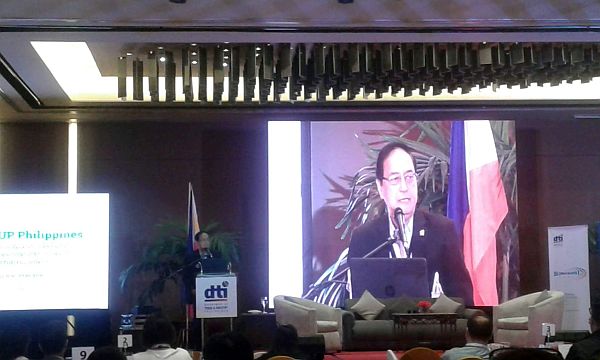
Department of Trade and Industry’s export marketing bureau director Senen Perlada talks about the Philippine Startup Ecosystem at the Slingshot Cebu conference at Marco Polo Plaza in Barangay Busay, Cebu City on Tuesday, Aug. 8, 2017.
CDN PHOTO/Victor Anthony V. Silva
In a bid to turn the Philippines into a magnet for startups, the Department of Trade and Industry (DTI) is pushing for the creation of innovation economic zones across the country.
Senen Perlada, director of the DTI’s export marketing bureau, said they plan to carve out certain areas in the Philippines where startups, upon locating, can receive fiscal and non-fiscal incentives.
“The principle here is to help startups get over humps in their growth through this initiative,” he told reporters on the sidelines of the Slingshot Philippines Cebu conference on Tuesday at the Marco Polo Plaza.
Close to 300 participants coming from tech startups, enterprises, government, academe, business chambers, media, as well as other members of the startup and innovation ecosystem in the country attended the event.
The establishment of innovation economic zones is the fifth item in the DTI’s five-point action agenda aimed at fostering a culture of innovation, entrepreneurship, and a robust startup system.
The first four are fostering a culture of entrepreneurship and collaboration; addressing legal and regulatory barriers; delivering government support through services and access to capital and resources; and strengthening existing institutions that support the ecosystem.
On the proposed innovation economic zones, Perlada said these will be similar to the Philippine Economic Zone Authority (Peza)-accredited areas where business process outsourcing and manufacturing firms are located.
He said the economic zones will not only be for homegrown startups, but also for those from outside the country, paving the way to develop a robust startup ecosystem.
There is currently no fixed list of incentives yet, but among the perks the DTI is looking at are tax breaks and subsidies.
Whether or not startups need to register with the Peza to be eligible of incentives, Perlada said that is something the DTI has yet to determine.
Perlada said they currently have no specific time frame for the realization of the project, but they hoped to see it come to fruition within the term of President Rodrigo Duterte.
He said the initiative should be taken into the context of several bills seeking to help the startup community in the Philippines, among which are the Startup Bill and the Philippine Innovation Bill.
Under the Startup Bill, a P1-billion venture fund will be provided for startups.
Perlada added that these initiatives also form part of the DTI’s thrust to capacitate the export sector through a strong startup economy.
“For us, it is important to learn how to use these platforms and to be given these kinds of incentives. We have to be able to compete with the best of the best in the world,” he said.
The trade official said that businesses in the Philippines need the innovation provided by startups to be at par with, if not be better than, the rest of the world.
He said the Philippines has become the top exporter of virgin coconut oil to China because of online Chinese marketplace Alibaba.
Perlada explained that local exporters have set up offices in China and began importing their own products from the Philippines, and then selling them through the online platform.
“Since the stocks are already there, they can easily fulfill the orders even when the ordering is done here,” he said.
Through these government interventions, Perlada said they hope to transform startups into “scaleups” and eventually into “scalers.”
DTI Cebu Director Ma. Elena Arbon, for her part, said Tuesday’s event was an avenue for stakeholders to learn, network, and collaborate.
She said this synergy was necessary as Cebu gears up to become an “Innovation Island.”
“Let this be our North Star,” she said.